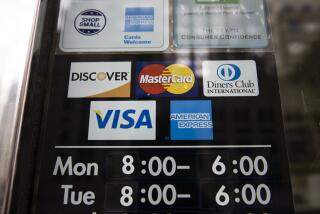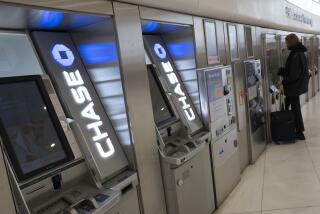ATM and overdraft fees rise again
- Share via
NEW YORK — You could be in for higher fees if you don’t keep an eye on your checking account.
Fees for bounced checks and withdrawing cash from an out-of-network ATM rose again this year, according to a survey released Monday by Bankrate.com.
The average cost of using another bank’s ATM is now $3.43, while a bounced check now costs an average of $28.95, up 2.5% from a year ago, according to the survey.
The good news is that avoiding such fees is easy.
“With 24-7 online access to your accounts, there’s really no excuse for losing track of your balance anymore,” said Greg McBride, senior financial analyst with Bankrate.com
Other good news: More banks are offering free checking accounts.
That’s one reason the average monthly service fee on non-interest-bearing checking accounts fell to $1.93, down steadily from 10 years ago when it was $5.37. That fee is applied only if you don’t maintain the minimum balance -- which dropped to an average of $109.26 this year, down from $155.49 last year.
The minimum needed to open an account was $82.71 this year, down from $83.02 last year.
A report by the Government Accountability Office this year found that 60% of banks offered free checking accounts in 2006. Still, many people who’ve been with their banks for a long time may not realize free checking accounts are widely available.
Bankrate.com’s survey was based on information from 249 banks and thrifts in the nation’s 25 largest metropolitan areas.
The $3.43 average ATM fee included the surcharge levied by the ATM’s owner for non-account holders ($1.97) as well as the fee banks charge for using an out-of-network ATM ($1.46).
Nearly all ATMs have surcharges for non-account holders, Bankrate.com said.
As for overdraft fees, the best defense is to link your checking account to a savings account, McBride said. A fee of $5 or $10 is usually charged for overdrafts in such cases.
Other overdraft protection options -- such as linking your checking account to a credit card -- is likely to be more expensive, McBride said. You’d also have to pay interest if you’re linking your account to a credit card.
Consumers also may not realize that banks sometimes have tiered fees for bounced checks, McBride said, meaning the fee for a second bounced check is higher than for the first.
It should be noted that overdraft fees, like most banking fees, are avoidable, said Carol Kaplan, a spokeswoman for the American Bankers Assn., an industry group based in Washington. She also noted that a GAO report this year found that the number of banks offering free checking doubled from 2001 to 2006.
Still, the GAO report also found that the income banks got from non-interest sources, including fees, rose to 27% last year, up from 24% in 2000.
More to Read
Inside the business of entertainment
The Wide Shot brings you news, analysis and insights on everything from streaming wars to production — and what it all means for the future.
You may occasionally receive promotional content from the Los Angeles Times.










